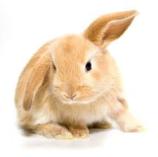
Looking After Your Rabbit
Rabbits
are lovable, inquisitive creatures that make wonderful companions. They are full of personality, each with their own special traits and quirks.
Rabbits love to play with toys and have lots of fun. As any rabbit owner will tell you, they are at their most adorable and irresistible when they express their joy by doing a binky - a high leap in
the air to let you know they are happy!
Rabbits can be litter trained, just like cats. Rabbits thrive on an indoor lifestyle and are the perfect pet option for those who live in an apartment or home with little or no yard space.
While rabbits are incredibly social, they are most active during the morning and evening which makes them the perfect pet for those who maintain a busy lifestyle during the day.
Diet & Nutrition
Rabbits are herbivores and require a diet that consists almost entirely of vegetable matter. Variety is essential, and food offerred must be fresh. An ideal diet
consists of:
80-90% (constant supply) fresh hay
This may include Timothy, Oaten, Wheaten, Pasture, Paddock, Meadow or Ryegrass hays. Grass or grass hay is a crucial element of a rabbit’s diet, as it provides the fibre needed to maintain good gastrointestinal health. It also encourages chewing for long periods, which helps to keep teeth clean and healthy.
10-20% (two cups per kg of body weight daily) fresh green vegetables
This may include cos, romaine and rocket lettuce, or other dark-coloured or purple-coloured lettuces, bok choy, silverbeet, endive, small amount of broccoli, broccoli and cauliflower leaves, celery (especially the leaves), carrot tops (the green part), snow peas, brussel sprouts, spinach leaves, basil, mint, parsley, coriander, small amount of kale.
5% (three tablespoons daily) treats
This may include carrot, green capsicum, apple (no core or seeds), banana and peel, watermelon, strawberries, sultanas.
Health
An important responsibility of rabbit ownership is ensuring that you take your rabbit to the vet at least once a year for a check up. The vet will check that:
- The rabbit's teeth are growing normally and are not too long.
- The rabiit is vaccinated against calicivirus (more information below).
- The rabbit's eyes, ears, skin, nails and body condition are healthy.
If you notice signs of illness in your rabbit at any time, please seek immediate vet advice. Signs of illness may include:
- Watery eyes
- Runny nose
- Breathing difficulties (including noisy breathing)
- Hair loss or skin problems
- Diarrhoea
- Changes in weight or appetite
- Behavioural changes
Rabbits instinctively hide any signs of illness as a protective mechanism, since predators will usually target a weak animal. Because of this, once it becomes obvious that your rabbit is unwell, its health can deteriorate quickly, so you should seek veterinary advice straight away.
Grooming
Rabbits shed hair year round, particularly during the warmer months. Grooming is important for keeping their coat clean and healthy and is also an excellent way to bond with your rabbit.
Short haired rabbits should be groomed weekly using a soft rubber brush, stroking in the direction of the fur.
Long haired rabbits need daily grooming to prevent matts and should be groomed with a slicker brush or comb. In addition, they will need to have their coat clipped or plucked regularly. This will prevent them from swallowing too much hair when grooming themselves. Unlike cats, rabbits are not able to vomit if they have a hairball and instead, this can create a dangerous blockage in their gut. This condition is known as woolblock and can cause the rabbit to become very sick if left untreated. Early signs include appetite loss and the size of their droppings can become smaller than usual. Keeping longer haired rabbits as litter trained, indoor pets can help keep their coats clean and free of debris.
Nails should be clipped regularly to prevent foot problems. Each nail has a blood vessel running up the middle and it is important to avoid cutting this as it is very painful and will cause bleeding. A vet or experienced pet groomer can show you how to trim your rabbit’s nails successfully.
Enrichment and exercise
We all need to run and play to keep our minds and bodies healthy. Rabbits are no exception! To ensure that your rabbit is happy and healthy, make sure you provide a variety of environmental enrichment, including the following:
Enrichment items
- Wooden toys to chew. These help keep teeth healthy and stop them growing too long.
- Hiding boxes. Even a cardboard box can be great!
- Tunnels to play and hide in.
- Treat toys, such as grass/hay balls. This is a great form of enrichment, as your bunny will work to get all the yummy food inside.
- Hay/grass tubes, which you can purchase as a toy or make by stuffing some hay or grass into a carbdoard tube.
Come and talk to us in store to see how we can help enrich your rabbit's mind & body.

